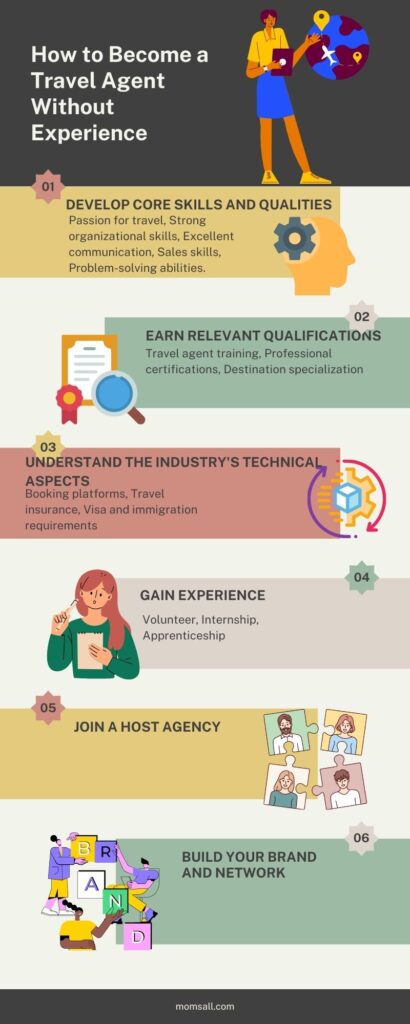The travel industry beckons those with a passion for exploration and a knack for planning memorable journeys. Despite the common belief that becoming a travel agent requires years of experience, there are strategic steps you can take to launch a successful career without prior industry exposure.
Related: Best Travel Backpack – Pick the Right Backpack for Your Trip
- How to Become a Travel Agent Without Experience - 6 Proven Steps
- Understanding the Role of a Travel Agent
- Challenges Faced by Beginners
- Education and Training Options
- Building a Strong Foundation
- Networking in the Travel Industry
- Utilizing Online Resources
- Gaining Practical Experience
- Showcasing Your Passion for Travel
- Developing Customer Service Skills
- Staying Informed About Travel Trends
- Exploring Niche Markets
- Building an Online Presence
- Securing Certifications and Accreditation
- Overcoming Common Misconceptions
- Final Thoughts
- Additional Resources:
How to Become a Travel Agent Without Experience – 6 Proven Steps

Embarking on a career as a travel agent opens doors to a world of excitement and adventure. With the travel industry’s continuous growth, the demand for skilled travel agents has never been higher. In this article, we’ll explore the various strategies and approaches you can adopt to become a travel agent without any prior experience.
Understanding the Role of a Travel Agent
Responsibilities and Skills Required
Being a travel agent is more than just booking flights and hotels. It involves understanding client preferences, planning itineraries, and providing expert advice on destinations. Developing excellent communication and organizational skills is crucial for success in this dynamic field.
Benefits of Becoming a Travel Agent
Apart from the joy of helping others create unforgettable travel experiences, becoming a travel agent offers the flexibility of working independently or with established agencies. The potential for earning commissions and discounts on personal travel adds an extra incentive.
Challenges Faced by Beginners
Lack of Experience in the Travel Industry
Entering the travel industry without prior experience may seem daunting, but it’s not insurmountable. Acknowledging the challenges and actively seeking solutions is the first step towards building a successful career.
Overcoming Common Hurdles
Navigating through initial challenges such as building a clientele, understanding complex travel regulations, and choosing the right suppliers can be overwhelming. However, with determination and the right strategies, these hurdles can be overcome.
Education and Training Options
Formal Education vs. On-the-Job Training
While formal education in travel and tourism can provide a solid foundation, on-the-job training allows you to learn the ropes through practical experience. Consider the option that aligns with your learning style and career goals.
Specialized Courses for Aspiring Travel Agents
Explore specialized courses designed for aspiring travel agents. These courses cover topics such as destination knowledge, travel technology, and customer service—essential elements for a successful career in travel.
Building a Strong Foundation
Developing Knowledge in Geography and Tourism
A solid understanding of global geography and tourism trends is fundamental. Knowing popular destinations, cultural nuances, and travel seasons enhances your ability to create tailored and memorable experiences for clients.
Understanding Travel Regulations and Documentation
Navigating the complex world of travel regulations is a crucial aspect of the job. Familiarize yourself with visa requirements, travel insurance policies, and other documentation to provide accurate and reliable information to your clients.
Networking in the Travel Industry
Importance of Building Connections
Networking plays a pivotal role in the travel industry. Attend industry events, join travel associations, and connect with professionals to build a network that can offer support, advice, and potential business opportunities.
Attending Industry Events and Conferences
Participating in industry events and conferences provides valuable insights into current trends, supplier relationships, and emerging opportunities. It’s an excellent way to stay updated and expand your professional circle.
Utilizing Online Resources
Learning from Reputable Travel Websites
Stay informed about the latest travel trends, destination updates, and industry news by following reputable travel websites. Engaging with online resources helps you stay ahead of the curve and offer relevant and up-to-date information to your clients.
Participating in Online Forums and Communities
Joining online forums and communities dedicated to travel agents allows you to connect with experienced professionals, seek advice, and share your own insights. The collective knowledge of these communities can be a valuable resource.
Gaining Practical Experience
Internships and Volunteer Opportunities
Consider internships or volunteer opportunities with travel agencies or organizations. Practical experience provides hands-on learning and allows you to apply theoretical knowledge in real-world scenarios.
Working with Established Travel Agencies
Collaborating with established travel agencies provides exposure to the industry’s workings and helps you learn from experienced professionals. It’s an invaluable opportunity to observe, learn, and contribute to the success of a team.
Showcasing Your Passion for Travel
Creating a Personal Brand
Develop a personal brand that reflects your passion for travel and your commitment to providing exceptional service. A strong personal brand sets you apart in a competitive market.
Utilizing Social Media to Share Experiences
Leverage social media platforms to showcase your travel experiences, industry knowledge, and client testimonials. Engaging content on platforms like Instagram, Facebook, and LinkedIn can attract potential clients and build your online presence.
Developing Customer Service Skills
Importance of Excellent Customer Service
Exceptional customer service is the cornerstone of a successful travel agent. Building strong relationships with clients, understanding their needs, and providing personalized solutions contribute to long-term success.
Handling Challenging Situations
Effective problem-solving and conflict resolution skills are essential when dealing with challenging situations. Navigating unexpected issues with professionalism enhances your reputation and builds trust with clients.
Staying Informed About Travel Trends
Continuous Learning and Adaptability
The travel industry is dynamic, with trends constantly evolving. Stay informed through continuous learning, whether through industry publications, webinars, or workshops. Being adaptable ensures you can meet the ever-changing demands of the market.
Keeping Up with Industry Updates
Subscribe to industry newsletters, follow key influencers, and stay updated on global events impacting travel. Being well-informed allows you to offer timely and relevant advice to your clients.
Exploring Niche Markets
Identifying and Catering to Specific Interests
Consider specializing in niche markets to differentiate yourself. Whether it’s adventure travel, luxury cruises, or eco-tourism, catering to specific interests allows you to become an expert in a particular niche.
Becoming an Expert in a Particular Travel Niche
Deepen your knowledge in a specific travel niche by attending specialized courses, networking with experts in that niche, and gaining practical experience. Position yourself as the go-to expert for clients with unique preferences.
Building an Online Presence
Creating a Professional Website
A professional website serves as your virtual storefront. Include a portfolio of your travel experiences, client testimonials, and a user-friendly interface that makes it easy for potential clients to reach out.
Leveraging Social Media for Marketing
Utilize social media as a marketing tool to reach a wider audience. Share engaging content, run targeted campaigns, and interact with your audience to build a community around your brand.
Securing Certifications and Accreditation
Recognized Certifications for Travel Agents
Invest in certifications recognized by the industry. Certifications not only enhance your credibility but also demonstrate your commitment to maintaining high standards in your profession.
Benefits of Accreditation
Being accredited by reputable travel organizations adds credibility to your business. Clients are more likely to trust agents with recognized accreditations, and it opens doors to collaboration with major suppliers.
Overcoming Common Misconceptions
Dispelling Myths About Becoming a Travel Agent
Address common misconceptions, such as the belief that travel agents are becoming obsolete due to online booking platforms. Highlight the personalized service and expertise that set travel agents apart.
Realistic Expectations for Newcomers
Set realistic expectations for newcomers. Building a successful career takes time, effort, and dedication. Encourage aspiring travel agents to stay persistent and focus on continuous improvement.
Related: Traveling to Nigeria Requirements: Trusted Local Travel Agencies to Assist with Your Trip to Nigeria
Final Thoughts
Becoming a travel agent without experience is not only possible but can be a rewarding journey filled with learning and adventure. By following these strategic steps, aspiring travel agents can overcome challenges, build a strong foundation, and carve out a niche in this dynamic industry.
In conclusion, the key lies in continuous learning, networking, and showcasing a genuine passion for travel. As the travel industry continues to evolve, those with the right mix of skills, knowledge, and enthusiasm are well-positioned for a successful and fulfilling career.
Additional Resources:
- The Travel Institute: https://www.thetravelinstitute.com/
- American Society of Travel Agents (ASTA): https://www.asta.org/
- The International Air Transport Association (IATA): https://www.iata.org/





